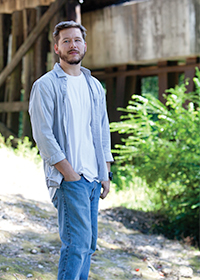David Armand
President's Award for Excellence in Artistic Activity
Young Author's Work Garnering Widespread Respect

After the kids are in bed and the house is quiet, author David Armand turns his attention to one of his latest writing projects. Using a pen and pad, he picks up where he left off – either that morning or late the night before – working on one of his two works in progress: a second memoir on his life as a kid growing up in Folsom with an abusive adoptive father or another novel using the Florida Parishes of southeast Louisiana as a locale.
“It is the first time I am writing two very different pieces simultaneously; so if I get stuck on one, I turn to the other,” said Armand, instructor of English and winner of this year’s President’s Award for Excellence in Artistic Activity.
The young author – a 2004 graduate of Southeastern’s undergraduate English program and its master’s level creative writing program (2006) – has three novels and a book of poetry under his belt now. His latest published work was a memoir, My Mother’s House, based on his relationship with his biological mother, who was diagnosed a schizophrenic when he was a young boy.
A native of Metairie, he grew up in Folsom under the care of his adoptive parents. That part of Louisiana, particularly St. Tammany, Washington and St. Helena parishes, had a tremendous impact on him. It has become for him what William Faulker and Eudora Welty refer to as a “sense of place.”
“Louisiana is my ‘place,’” Armand explained. “I always have to be writing about Louisiana; it is what I know. One of the most powerful aspects of literature is how the most inherently regional stories are often the most universally understood.”
“While his novels and short fiction reach an international audience, his topics and settings are firmly rooted in Louisiana, bringing recognition and interest to the state,” emphasized Susan Swartwout, professor of English at Southeast Missouri State and publisher of its university press, which published My Mother’s House.
“My ideas always start with a single image, usually someone doing something. I build around that image answering questions about the scene,” he said. “I never plot or plan things out. My characters come organically and are based on people I’ve known or an amalgamation of individuals.”
“What particularly stands out for me is David’s accomplished and beautiful language, which like all great style is readily recognizable but not easily explainable,” explained Professor and Head of the Department of English David C. Hanson.
Honors and recognition for his work come frequently: My Mother’s House was named the sole runner-up in the William Faulkner-William Wisdom Competition, and he was selected two years ago to participate in the prestigious Sewanee Writers Conference at the University of the South in Tennessee, a two-week writer’s boot camp with lectures, readings and workshops led by established writers. Armand has collected other awards, including being named Alumnus of the Year by Southeastern’s College of Arts, Humanities and Social Sciences, receiving the Faculty Senate President’s Award, being designated one of “40 under 40” to watch by Gambit Weekly, and being named to third place in Southern Writers Magazine for his short story “Father and Son, Hunting.”
Armand’s “day job” is teaching creative writing to undergraduate and graduate students at Southeastern. He finds it difficult to do his creative writing in his academic office because he keeps his door open for students to visit any time he’s not in class.
It’s payback in a sense: “Without the great instruction and support I received from this university over the years, my creative work would have never been realized, let alone published,” he said. Armand credits Southeastern teachers and mentors Jack Bedell, Norman German, Tim Gautreaux and others for the influence they had in his early writing years.
His teaching also extends to high school students. Armand is an instructor in Southeastern’s Dual Enrollment program, which allows qualified high school students to take credit-earning courses such as freshman English composition while still in high school.
“I love going out to the high schools, and I’m interested in the students and the enthusiasm they show in taking college-level courses,” he said. “Of course, I use the opportunity to try to recruit them to come to Southeastern when they start college.”
With success as a professional author, teacher, and mentor, Armand’s readers and students are thankful he continues to pay it forward with his creativity and command of the written word.






